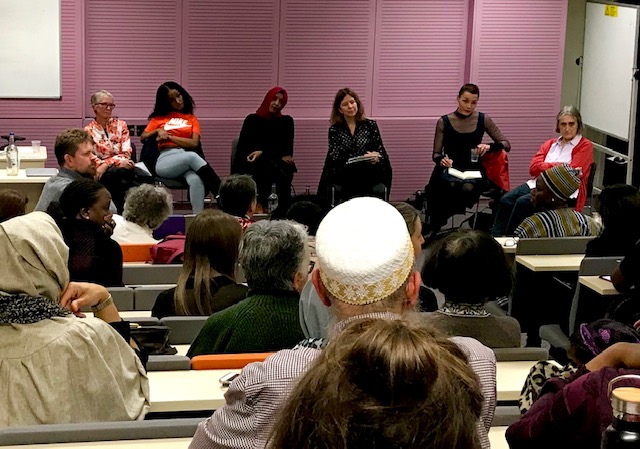An extraordinary meeting was held in London on 15 February 2019. At first glance, it appeared to be just another hosted by the School of Oriental and African Studies, London University. But in reality it was the first where activists, community members, practitioners, researchers and members of the public came together to discuss the downsides and flaws of the dominant anti-FGM discourse and to illustrate the problems it generated.
The initiative was the brainchild of Hidden Voices UK, who had invited us to a critical discussion about “the prevailing single narrative which overshadows women who have undergone the act” and “the heavy-handed use of the law”. They also wanted to discuss some of the methods used (or misused) to present a version of reality in which high numbers of girls in the UK and Europe are said to be at risk of FGM, and the illegal activities in regard to it that are supposed to be pervasive among immigrant communities.
The Panel
Five knowledgeable people were introduced who then initiated the conversation. They included:
• Zainab Nur, Hidden Voices UK,
• Nasra Ayub, Lead Outreach Worker, Integrate UK,
• Alison Macfarlane, BA, Dip Stat, CStat, FFPH Professor of Perinatal Health, Centre for Maternal and Child Health Research, City, University of London
• Bríd Hehir, Researcher, blogger and retired health professional
• Brenda Kelly, Consultant Obstetrician, Oxford University Hospitals NHS Foundation Trust, Clinical lead of the Oxford Rose Clinic, a specialist service for women and girls with FGM, and patron of the charity Oxford Against Cutting
The Chair was the BBC’s Africa Editor Mary Harper. She helped ensure that attendees could contribute and be treated with respect, particularly during the few heated moments.
Aspects raised included:
- Data – how estimates of girls and women who have undergone the practice are calculated as well as those deemed ‘at risk’, and how they are distorted in media reporting
- UKs legal framework – with reports about how the implementation of harsh protocols can create difficulties during healthcare encounters, and jeopardises the trusting relationship that providers seek to develop with patients (in this case those who have already undergone the act)
- The flourishing anti-FGM industry – considered worthy of much more critical scrutiny
- Terminology – particularly the use of the word ‘mutilation’ needs to be considered out of respect for girls and women who have undergone the procedure.
Particular concerns were raised about aspects of the single narrative. For example, irrespective of type or severity, the expectation that the ‘mutilation’ will automatically lead to women having life-long medical complications and sexual problems, tends to dominate. This may lead to women being automatically viewed as victims, with professionals focussing on their rather than their patients priorities. Ironically, women who do not view themselves as victims and have challenged this narrative have been known to be treated sub-optimally.
An experienced activist described how the work to combat the practice in the UK has morphed into activities that have become harmful to the communities. A recurrent theme was how the work of activist, the government and its agencies has led to stigmatisation, race profiling, and discrimination.
Much of the discourse builds on the false belief that FGM is widely practised in the UK, and families from African backgrounds have become particular targets of harsh interventions. A brave young woman from an activist organisation explained how her organisation, while working to raise awareness about FGM, tries via school campaigns, to do this in a way that won’t lead to stigmatisation of girls from these communities.
Questions about the information that is, could or should not be shared with school children in regard to FGM led to a particularly constructive discussion between the panellists and the audience. Some thought that specific, age appropriate information about ‘FGM’ should be given to all children. Others disagreed, suggesting that general genital education was more appropriate because it wouldn’t stigmatise minority groups. Many thought that detailed and descriptive FGM narratives and visuals should be avoided at all costs. Others questioned the need for educating children about FGM at all because it fuels the questionable premise that all children born to mothers who have undergone the practice are ‘at risk’.
The atmosphere was electric at times. That the meeting was characterised by frank conversations, with contributions from a variety of perspectives and critical positions, was to the Chair’s credit.
If the intention was to open up space for a new public conversation about FGM – a space that would allow more and different women to talk about their experiences and views of female circumcision which challenge the dominant discourse – this was an excellent start. That it was a public meeting with attendees and contributors from all walks of life helped make it unique. Many lingered to chat and network afterwards.
Six years ago, a multidisciplinary network of researchers from three continents tried to break through the dominant single narrative of FGM in this article published in The Hastings Centre Report: “Seven things to know about female genital surgeries in Africa”. More articles like that, and more meetings like this are needed to successfully challenge today’s narrative.
The unique aspect of the London meeting – something that makes it truly historical – is that such a large variety of participants: activists, community members, academics, practitioners, community workers and members of the public joined forces to open up room for a more nuanced and reality-oriented conversation about the circumcision of girls in our societies, and about the detrimental consequences of legislation, inflated figures and hyperbole.
Sara Johnsdotter is Professor of Medical Anthropology, Malmö University, Sweden.
Matthew Smith’s report of the event can be accessed here.

